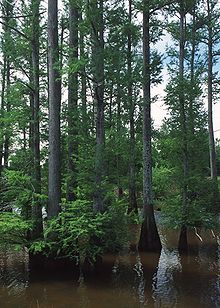Baldcypress
| Taxodium distichum | |
|---|---|
 |
|
| Bald cypress forest in a central Mississippi lake | |
| Scientific classification | |
| Kingdom: | Plantae |
| Division: | Pinophyta |
| Class: | Pinopsida |
| Order: | Pinales |
| Family: | Cupressaceae |
| Genus: | Taxodium |
| Species: | T. distichum |
| Binomial name | |
|
Taxodium distichum (L.) Rich. |
|
Taxodium distichum (bald cypress,baldcypress, bald-cypress, cypress, southern-cypress, white-cypress, tidewater red-cypress, Gulf-cypress, red-cypress, or swamp cypress) is a deciduous conifer in the family Cupressaceae that grows on saturated and seasonally inundated soils in the lowlands of the Southeastern and Gulf Coastal Plains of the United States.
Taxodium distichum is a large slow-growing and long-lived tree typically reaching heights of 30–35 m (100–120 ft) and a trunk diameter of 1–2 m (3–6 ft). The bark is gray-brown to red-brown, thin and fibrous with a stringy texture, having a vertically interwoven pattern of shallow ridges and narrow furrows. The leaves are alternate and linear, with flat blades borne on the twig that are spirally arranged on the stem, but twisted at the base to lie in two horizontal ranks, 1–2 cm long and 1–2 mm broad. Unlike most other species in the family Cupressaceae, it is deciduous, losing its leaves in the winter months, hence the name 'bald'. It is monoecious (separate staminate and carpellate flowers are always found on the same plant), with male and female flowers forming on slender tassel-like structures near the edge of the branchlets. The male and female strobili are produced from buds formed in the late fall, with pollination in early winter, and mature in about 12 months. The seed cones are green maturing gray-brown, globular, and 2-3.5 cm in diameter. They have from 20 to 30 spirally arranged, four-sided scales, each bearing one or two (rarely three) triangular seeds. The number of seeds per cone ranges from 20 to 40. The cones disintegrate when mature to release the large seeds. The seeds are 5–10 mm long, the largest of any species in the cypress family, and are produced every year, but with heavy crops every three to five years. The seedlings have three to 9 (most often six) cotyledons.
...
Wikipedia

